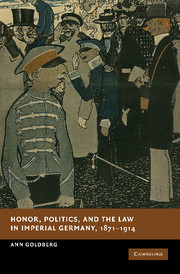4 - Politicization
Published online by Cambridge University Press: 03 May 2010
Summary
“Today's legal interpretation of §193 is nothing but a scare tactic against everything in the public interest [jede öffentliche Wirksamkeit]. Not only the woman, but the man is silenced under the Prussian state!”
“… our law courts almost completely fail in the task of protecting the honor of [our] citizens. Our system of justice has the un-germanic trait of protecting material property but not ideal goods [honor], which are contemptuously dismissed as merely conceited values.”
An impassioned debate over honor and the reform of libel law pervaded Germany's public square – in the press, the parliaments, the legal profession, and the courts – reaching a peak of intensity in the early years of the twentieth century. The debate was driven by two countervailing trends. On the one hand, state repression and press censorship were feeding tensions between Socialists and the government, while increasingly generating criticism beyond the Left. On the other hand, there were anxiety and anger about the perceived growth of threats to honor emanating most particularly from the “revolver press.” The first trend led to outcries against Beamtenbeleidigung and §193, spurring demands for greater protections of free speech and legal equality. The latter trend led in the opposite direction to demands for a crackdown on trial publicity, the admissibility of evidence in court (Wahrheitsbeweis), and for strengthening defamation sentencing.
- Type
- Chapter
- Information
- Honor, Politics, and the Law in Imperial Germany, 1871–1914 , pp. 115 - 156Publisher: Cambridge University PressPrint publication year: 2010



